|
 Secure Site
Secure Site
|
 |
 Unusual Soothing Alarm Clocks by Now & Zen, Inc. - Boulder, CO
Waking up in the morning is a metaphor for life — a kind of daily microcosmic reenactment of our overall purpose for being in the world. That is, just about every religious tradition emphasizes spiritual growth. And the connection between “awakening” and spiritual growth can be found in practically all forms of spiritual teaching.
So if waking up in the morning really is a metaphor for our larger spiritual lives, this perspective might help us treat our morning ritual of getting out of bed as a kind of spiritual practice. Indeed, when approached in this way, how we wake up in the morning can make a larger difference in our lives overall.
Perhaps this is stretching the matter, but there are many people who do recognize that something as simple as waking up in the morning can be an authentic form of spiritual practice. For those who don’t have to go to work or get the kids to school, waking up naturally, whenever their body feels like it, can be a wonderful version of this practice. Waking up without an alarm, whenever your body has had enough rest, is probably the healthiest option, and the one that will leave us feeling most refreshed and ready to start the day. However, there are few of us that have this luxury, especially during the week.
 Sleep Sounder - Choose an Unusual Soothing Clock with Acoustic Chime Fortunately, for those who want to wake up right, without being startled awake by an annoying alarm or some radio DJ, there is The Zen Alarm Clock. This clock was designed to make waking up a kind of spiritual practice. The Zen Clock wakes users with a built-in 10 minute gradual progression of acoustic chimes. And this gradual form of “progressive awakening” has been thoughtfully designed to include esoteric features that are fitting for a form of spiritual practice. For example, not only is the hardwood Zen Alarm Clock beautiful to see and hear, the clock’s chime is tuned to produce the same frequencies as the tuning forks used by musical therapists in their healing work. Moreover, the Zen Clock’s pre-programmed 10 minute chime progression sequence advances according to the “golden ratio,” which reflects both the natural proportions of our own bodies and the patterns of growth used in the overall evolution of the universe. Even those who care little about such esoteric details nevertheless report that they love waking up with the gentle chimes of a Zen Alarm Clock. And as the makers of the Zen Alarm Clock hope, we may eventually come to see many of the simple details of our lives as forms of authentic spiritual practice. 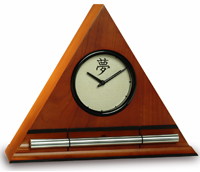 Waking up in the morning should be as pleasant as falling asleep at night. The Zen Alarm Clock's gradual, gentle awakening is transformative. Now & Zen – The Most Unusual Alarm Clock Headquarter Store
Soothing Acoustic Chime Alarm Clocks & Timers
1638 Pearl Street
Boulder, CO 80302
(800) 779-6383
Posted in Bamboo Chime Clocks, Insomnia, sleep, Sleep Habits
 Cherry Blossoms
Beyond the psychological inquiry into dreams or the self-improvement techniques of affirmations lies the ancient and sacred practice of meditation. Some form of meditation is practiced in every major world religion. Yogis, Christian mystics, Zen Buddhists, Quakers, practitioners of the Kabbalah, and Secular Humanists, all experience the benefits of meditation.
 A Moment of Stillness in Nature
The Zen Timepiece is an exquisite “accoutrement to meditation.” It can be used in a variety of ways to aid your practice and encourage you to “make time” to meditate. The first and most basic use of the Zen Timepiece in your meditation practice is as a signal of the end of your allotted meditation time.
If you want to meditate for twenty minutes, simply set our Chime countdown timer for twenty minutes and begin your meditation. When the countdown timer reaches zero and the bowl/gong is struck, you can choose to end there or continue your meditation for about three and a half minutes until the next bowl strike, or even longer. Many meditators find that a “three and a half minute warning” is a perfect interval in which to gradually conclude their longer meditations. The first strike signals the final phase of the meditation and the second strike its conclusion. The beauty of the brass bowl/gong is that it complements rather than disturbs the meditative state while acting as an effective timer. No matter how you use it, the sonic clarity of the brass bowl provides an appropriate conclusion to your stillness.
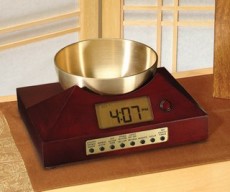 Now & Zen Headquarter Store, Boulder, CO
Now & Zen Headquarter Store, Boulder, CO
The bowl that comes with the Zen Timepiece is made from the following five metals: copper, zinc, lead, iron, and tin. It has been formed using the same forging techniques that have been used in Asia for two thousand years. Unlike hand-hammered Himalayan-style bowls, our Zen Timepiece’s rin gong bowl is made using methods which first appeared in Japan in the first century. Following these traditions, your bowl’s long-resonating tone has been carefully selected to bring beauty and harmony to your environment.
 Clocks and Timers with Gentle, Soothing Chimes
Now & Zen’s Chime Alarm Clock Shop
Home of The Zen Alarm Clock & Zen Timepiece with Singing Bowl
1638 Pearl Street
Boulder, CO 80302
(800) 779-6383
Posted in Japanese Inspired Zen Clocks, Meditation Timers, Meditation Tools, Natural Awakening, Now & Zen Alarm Clocks, Progressive Awakening, Yoga Timers by Now & Zen, Zen Timepiece by Now & Zen, Zen Timers
 Choose the Best Alarm Clock to Ring Your Bells - A Courtesan and Attendant on a Moonlit Veranda harunobu The way we want to be awakened varies as much as the timepieces we use to get us up and going.
Invented in 1787, the alarm clock has become a necessity.
“Alarm clocks are a very individual thing,” says Neil B. Kavey, director of sleep disorders for New York-Presbyterian Hospital at Columbian Presbyterian Medical Center in Manhattan. “Some people have very strong preferences when it comes to alarm clocks. People who are sleep-deprived need an alarm that will wake them up instead of the sound of a chirping bird.”
But some people don’t like to be awaken by jarring bells or having to jump out of bed when the alarm sounds. Some people like to sleep an extra hour and therefore set the alarm to go off an hour early, while others like to hit the snooze button.
“Snooze alarms are helpful, but you get an interrupted sleep,” says Kavey, who noted that he is speaking clinically rather than scientifically when it comes to alarm clocks. “It’s best to get an alarm on a clock that you can live with and set it for the latest time possible, so you can sleep straight through till it’s time to get up. If you are getting enough sleep, you may only need a quiet or soothing alarm to wake you. But young people are such intense sleepers that they often require a loud alarm clock.”
Stores are filled with clocks from those that wake you with your favorite music to those that “ring” with the sound of ocean waves, rain, a babbling brook or a breeze blowing through pines.
There are even clocks that simulate the rising sun by gradually increasing the light from a high-intensity bulb during a period of 30 minutes.
“If you are worried about a power outage or getting up on time to catch a plane or for an important meeting, you might want to set two clocks, where one runs on a battery,” says Kavey. “But if you are getting enough sleep on a regular basis, you wouldn’t need an alarm clock. You’d wake up automatically based on your biological rhythms.”
 "The Zen Alarm Clock," uses soothing acoustic chimes that awaken users gently and gradually, making waking up a real pleasure. Just Say No to a Snooze Button
Most modern alarm clocks include a “snooze button” mechanism which allows the user to go back to sleep for a brief period after the initial alarm.
While this may make it easier for some people to “face the day,” here at Now & Zen we feel the whole concept of a snooze button is “all wrong.”
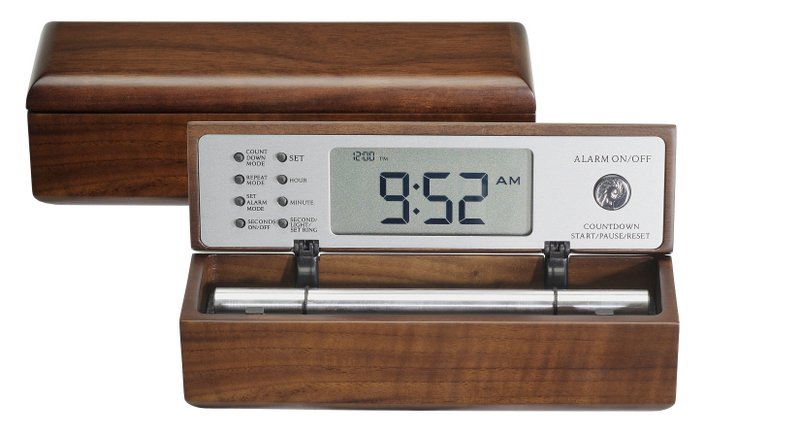 Wake up with gradual, beautiful acoustic chimes. The Zen Alarm Clock transforms your mornings and gets you started right, with a progressive awakening
People want snooze buttons because they want to awaken gradually. And this is only natural because just as our bodies fall asleep gradually, our bodies also want to wake up gradually. However, with a regular, snooze button-equipped alarm clock the user is initially “startled awake” by the alarm, and then continually startled awake with each press of the snooze button. This is not the way to treat your body because it creates a kind of merry-go-round of multiple “rude awakenings.”
As an alternative we recommend using our Zen Alarm Clock, which wakes users gradually with a built-in 10 minute progression of gradually increasing acoustic chimes. It really is a better way to get up in the morning. Zen Alarm Clocks make waking up a beautiful experience. And once you experience the Zen Clock’s gradual 10 minute chime progression, you will never want to wake up any other way again.
adapted from sfgate.com by Frances Ingraham Heins, Albany Times Union
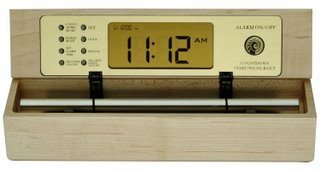 One of the ultimate Zen like experiences is waking-up from a great slumber refreshed and energized. Your mind and body are harmoniously one, both alert and focused. Now & Zen – The Chime Alarm Clocks Store
1638 Pearl Street
Boulder, CO 80302
(800) 779-6383
orders@now-zen.com
 When the clock's alarm is triggered, its chime produces a long-resonating, beautiful acoustic tone reminiscent of a temple gong.
Posted in Bamboo Chime Clocks, sleep, Sleep Habits, wake up alarm clock
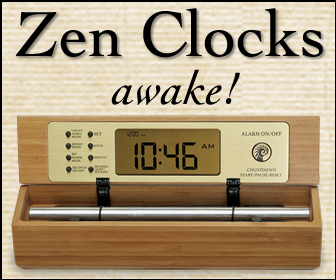 soothing chime alarm clocks The Bamboo Digital Zen Clock’s long-resonating Tibetan bell-like chime makes waking up a beautiful experience – its progressive chimes begin your day with grace. When the clock’s alarm is triggered, the acoustic chime bar is struck just once … 3-1/2 minutes later it strikes again … chime strikes become more frequent over 10 minutes … eventually striking every 5 seconds until shut off. As they become more frequent, the gentle chimes will always wake you up – your body really doesn’t need to be awakened harshly, with a Zen Clock you’re awakened more gradually and thus more naturally. Unlike artificial recorded sounds coming out of a tiny speaker in a plastic box, natural acoustic sounds transform your bedroom or office environment.
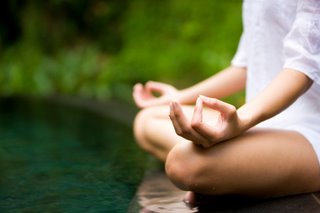 Zen Clocks awakened you more gradually and thus more naturally Now & Zen Headquarter Store
1638 Pearl Street
Boulder, CO 80302
(800) 779-6383
Posted in Chime Alarm Clocks
 Gong Timer - Boost Your Short-Term Memory - Utagawa Toyokuni Ukiyo-e Woodblock A certain type of meditation may help the brain retain images for short periods, says a new study on visual-spatial abilities.
When people view an object, they usually retain a clear picture of it in their visual short-term memory for only a few seconds before the details fade. An experiment by George Mason University researchers, though, found that people who practice Deity Yoga (DY) do much better at visual-spatial tasks shortly after they meditate.
The study’s authors, writing in a recent issue of Psychological Science, said the finding may have “many implications for therapy, treatment of memory loss and mental training.”
Practitioners of DY meditation zero in on an image of their deity, conjuring up a vivid, three-dimensional mental picture of it while honing in on the deity’s emotions and environment.
In the experiment, led by psychologist Maria Kozhevnikov, meditation and non-meditation practitioners performed two visual-spatial tests: imagining the rotation of a 3-D object and viewing an image, then trying to identify it from among several other similar images. After a first round of tests, the participants spent the next 20 minutes either meditating or performing non-meditative tasks before being tested again.
All the subjects had similar scores on the first round of tests, suggesting that meditating in general causes no overall, long-term improvement in visual-spatial skills.
However, those who performed DY meditation between rounds did much better on both tasks in the second phase of tests than those who did non-meditative activities or practiced Open Presence (OP) meditation. OP practitioners, rather than focusing on a specific thing, try to achieve awareness by contemplating a wider array of experiences, images or thoughts that may come to them.
 Gong Timer Can Help Boost Your Short-Term Memory if You Use it to Meditate The study authors concluded that further investigations should be done to see if other visual meditation techniques can produce similar improvements in visual-spatial memory or if the results are specific to DY meditation.
More information
The National Center for Complementary and Alternative Medicine has more about the health benefits of meditation.
SOURCE: Association for Psychological Science, news release, April 27, 2009
“Mindfulness” is the spiritual practice of being aware of your present moment. World famous Zen monk Thich Nhat Hanh has developed the use of a bowl-gong in a practice he calls the “mindfulness bell.” When you hear the sound of the mindfulness bell, you are invited to take a moment to breathe in and out and center yourself in the present. This practice allows the sound of the bowl-gong to periodically connect you to the peace and tranquility that resides inside you right now. This delightful practice reduces stress and improves your overall health.
Our Zen Timepiece’s acoustic 6-inch brass bowl-gong clock is the world’s ultimate alarm clock, practice timer, and “mindfulness bell.”
It fills your environment with beautifully complex tones whenever it strikes. In the morning, its exquisite sounds summon your consciousness into awakening with a series of subtle gongs that provide an elegant beginning to your day. Once you experience the Zen Timepiece’s progressive awakening, you’ll never want to wake up any other way. It also serves as the perfect meditation timer. Available in 5 wood styles, including bamboo (shown).
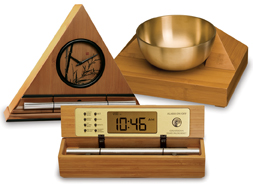 Gong Timers from Now & Zen - Boulder, Colorado Now & Zen – The Gong Timer Store
Downtown Boulder
1638 Pearl Street
Boulder, CO 80302
(800) 779-6383
Posted in Zen Clocks and Dream Recall, Zen Timers
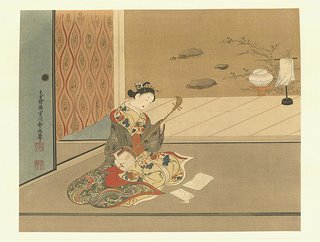 Set Your Gong Meditation Timer - Dama tocando el Samisem -artista Shunsui Katsu-Miyagawa A certain type of meditation may help the brain retain images for short periods, says a new study on visual-spatial abilities.
When people view an object, they usually retain a clear picture of it in their visual short-term memory for only a few seconds before the details fade. An experiment by George Mason University researchers, though, found that people who practice Deity Yoga (DY) do much better at visual-spatial tasks shortly after they meditate.
The study’s authors, writing in a recent issue of Psychological Science, said the finding may have “many implications for therapy, treatment of memory loss and mental training.”
Practitioners of DY meditation zero in on an image of their deity, conjuring up a vivid, three-dimensional mental picture of it while honing in on the deity’s emotions and environment.
In the experiment, led by psychologist Maria Kozhevnikov, meditation and non-meditation practitioners performed two visual-spatial tests: imagining the rotation of a 3-D object and viewing an image, then trying to identify it from among several other similar images. After a first round of tests, the participants spent the next 20 minutes either meditating or performing non-meditative tasks before being tested again.
All the subjects had similar scores on the first round of tests, suggesting that meditating in general causes no overall, long-term improvement in visual-spatial skills.
However, those who performed DY meditation between rounds did much better on both tasks in the second phase of tests than those who did non-meditative activities or practiced Open Presence (OP) meditation. OP practitioners, rather than focusing on a specific thing, try to achieve awareness by contemplating a wider array of experiences, images or thoughts that may come to them.
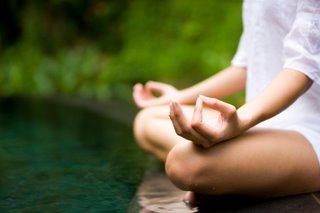 Choose a Gong Meditation Timer for Your Mindfulness Practice The study authors concluded that further investigations should be done to see if other visual meditation techniques can produce similar improvements in visual-spatial memory or if the results are specific to DY meditation.
Use our unique “Zen Clock” which functions as a Yoga & Meditation Timer. It features a long-resonating acoustic chime that brings your meditation or yoga session to a gradual close, preserving the environment of stillness while also acting as an effective time signal.
Our Yoga Timer & Clock can be programmed to chime at the end of the meditation or yoga session or periodically throughout the session as a kind of sonic yantra. The beauty and functionality of the Zen Clock/Timer makes it a meditation tool that can actually help you “make time” for meditation in your life. Bring yourself back to balance.
More information
The National Center for Complementary and Alternative Medicine has more about the health benefits of meditation.
SOURCE: Association for Psychological Science, news release, April 27, 2009
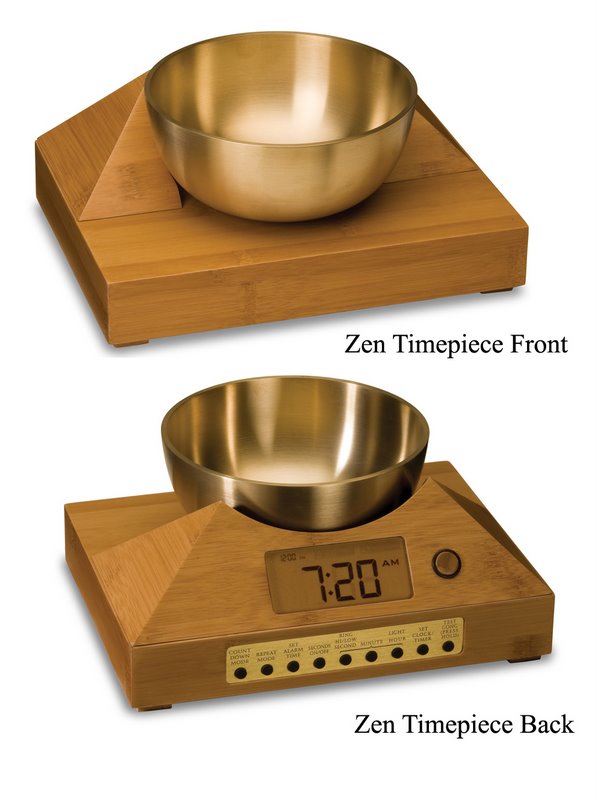 Set Your Gong Meditation Timer for Your Mindfulness Practice Now & Zen – The Gong Meditation Timer
 The Gong Meditation Store - Boulder, CO 1638 Pearl Street
Boulder, CO 80302
(800) 779-6383
orders@now-zen.com
Posted in Well-being, Yoga Timers by Now & Zen, Zen Timepiece by Now & Zen, Zen Timers
 Choose an Alarm Clock with Real Acoustic Sounds -- Chime and Gong Clocks from Now & Zen, Inc. Study: More Sleep, Sharper Brain
Everybody feels refreshed following a good night’s sleep. But can you wake up smarter? More artistic perhaps?
German scientists say they have demonstrated for the first time that our sleeping brains continue working on problems that baffle us during the day, and the right answer may come more easily after eight hours of rest.
The German study is considered to be the first hard evidence supporting the common sense notion that creativity and problem solving appear to be directly linked to adequate sleep, scientists say. Other researchers who did not contribute to the experiment say it provides a valuable reminder for overtired workers and students that sleep is often the best medicine.
Previous studies have shown that 70 million Americans are sleep-deprived, contributing to increased accidents, worsening health and lower test scores. But the new German experiment takes the subject a step further to show how sleep can help to turn yesterday’s problem into today’s solution.
“A single study never settles an issue once and for all, but I would say this study does advance the field significantly,” said Dr. Carl E. Hunt, director of the National Center on Sleep Disorders Research at the National Institutes of Health.
“It’s going to have potentially important results for children for school performance and for adults for work performance,” Hunt said.
 Solve Problems in Your Sleep - Tsukyoka Yoshitoshi 1888 Sleepers Solve Problems Better
Scientists at the University of Luebeck in Germany found that volunteers taking a simple math test were three times more likely than sleep-deprived participants to figure out a hidden rule for converting the numbers into the right answer if they had eight hours of sleep. The results appear in Thursday’s issue of the journal Nature.
The study involved 106 people divided into five separate groups of equal numbers of men and women ages 18 to 32. One group slept, another stayed awake all night, and a third stayed awake all day for eight-hour periods before testing following training in the main experiment. Two other groups were used in a supplemental experiment.
The study participants performed a “number reduction task” according to two rules that allowed them to transform strings of eight digits into a new string that fit the rules. A third rule was hidden in the pattern, and researchers monitored the test subjects continuously to see when they figure out the third rule.
The group that got eight hours of sleep before tackling the problem was nearly three times more likely to figure out the rule than the group that stayed awake at night.
Jan Born, who led the study, said the results support biochemical studies of the brain that indicate memories are restructured before they are stored. Creativity also appears to be enhanced in the process, he said.
“This restructuring might be occurring in such a way that the problem is easier to solve,” Born said.
Born said the exact process in the sleeping brain for sharpening these abilities remains unclear. The changes leading to creativity or problem-solving insight occur during “slow wave” or deep sleep that typically occurs in the first four hours of the sleep cycle, he said.
Better Memory
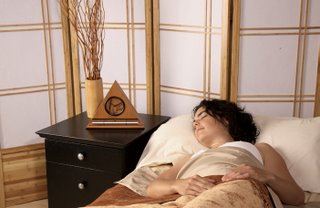 Choose an Alarm Clocks with Real Sounds - Chime or Gong Alarm Clocks Available The results also may explain the memory problems associated with aging because older people typically have trouble getting enough sleep, especially the kind of deep sleep needed to process memories, Born said.
“Even gradual decreases in the total time for slow wave sleep and deep sleep is correlated to a kind of decrease in memory function, and in turn to a decrease in the ability to recognize hidden structures or the awareness of such things,” Born said.
Other researchers said they have long suspected that sleep helps to consolidate memories and sharpen thoughts. But until now it had been difficult to design an experiment that would test how it improves insight.
History is dotted with incidents where artists and scientists have awakened to make their most notable contributions after long periods of frustration. For example, that’s how Russian chemist Dmitri Mendeleev established the periodic table of elements and British poet Samuel Taylor Coleridge wrote his epic “Kubla Khan.”
Born and his team “have applied a clever test that allows them to determine exactly when insight occurs,” wrote Pierre Maquet and Perrine Ruby at the University of Liege in a commentary on the research, also published in Nature.
Maquet and Ruby both say the study should be considered a warning to schools, employers and government agencies that sleep makes a huge difference in mental performance.
The results “give us good reason to fully respect our periods of sleep — especially given the current trend to recklessly curtail them,” they said.
adapted from abcnews.go.com by By William McCall
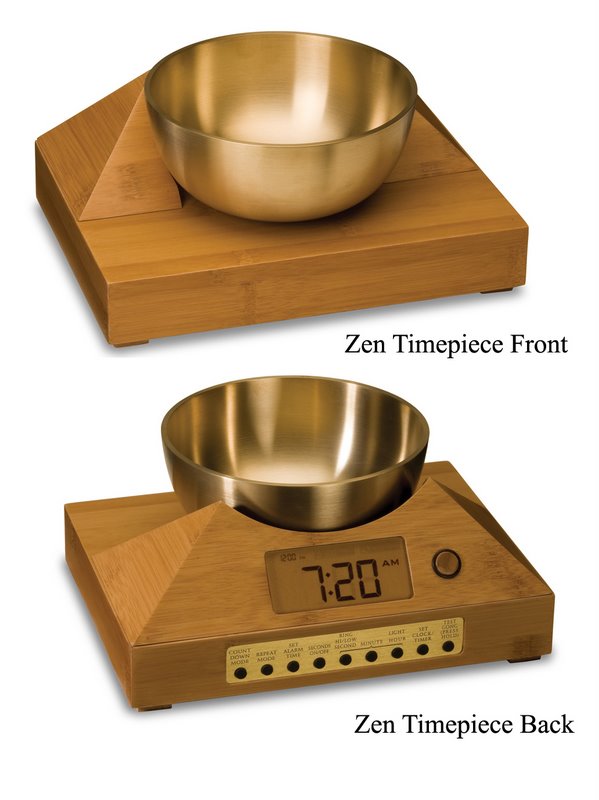 Sleep Sounder - Choose an Alarm Clock with Real Sounds - Chime or Gong Clocks Available Now & Zen
Clocks with Real Acoustic Sounds
1638 Pearl Street
Boulder, CO 80302
(800) 779-6383
The Zen Alarm Clock transforms mornings, awakening you gradually with a series of gentle acoustic chimes Once you use a Zen Clock nothing else will do.
Posted in Bamboo Chime Clocks, sleep, Sleep Habits
 Yoga Clocks and Timers by Now & Zen, Inc. YOGA FOR BEDTIME
Need help sleeping? Doing yoga exercises before bedtime can be just what you need
Sit up in bed comfortably, either with your legs folded or straight in front of you; whatever you can do with the most ease. Sit up and lean slightly back on your pillows or backboard. Close your eyes and rest your hands on your thighs and just breathe here for a few minutes. This doesn’t have to be a serious meditation but just a short while to do nothing but breathe.
Need a Yoga & Meditation timer? Get the natural one: A Bowl-Gong Bamboo Zen Timepiece from Now & Zen
Spiritual practices such as meditation or yoga are best done in an environment of beauty and tranquility. And the clock/timer you use for your practice can make a real difference in creating such an environment. But using a timer with artificial “beeps,” or even “recorded gongs,” coming out of a plastic box can be less than ideal. The Bamboo Zen Timepiece is unlike any other meditation timer on the market because it features a real, natural, acoustic, long-resonating gong, produced by its traditional Japanese style bowl-gong, or “rin-gong”. Moreover, The Zen Timepiece is made with sustainable natural bamboo, so it is as beautiful to see as it is to hear. Once you use a Zen Timepiece, nothing else will do.
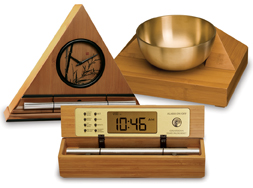 Yoga & Meditation Timer and Clocks Now & Zen – The Yoga Clock & Timer Store
1638 Pearl Street
Boulder, CO 80302
(800) 779-6383
Posted in Bamboo Chime Clocks, Meditation Timers, Meditation Tools, mindfulness practice, Well-being, Yoga Timer, Yoga Timers by Now & Zen, Zen Alarm Clock, Zen Timepiece by Now & Zen, Zen Timers
 Choose a Soothing Chime Timer for Your Mindfulness Practice - Utgarwa Beauty Mindfulness
“Mindfulness” is the spiritual practice of being aware of your present moment. World famous Zen monk Thich Nhat Hanh has developed the use of a bowl-gong in a practice he calls the “mindfulness bell.” When you hear the sound of the mindfulness bell, you are invited to take a moment to breathe in and out and center yourself in the present. This practice allows the sound of the bowl-gong to periodically connect you to the peace and tranquility that resides inside you right now. This delightful practice reduces stress and improves your overall health.
Mindfulness practice, is increasingly being employed in Western psychology to alleviate a variety of mental and physical conditions.
Scientific research into mindfulness generally falls under the umbrella of positive psychology. Research has been ongoing over the last twenty or thirty years, with a surge of interest over the last decade in particular. In 2011, The Natural Institute for Health’s National Center for Complementary and Alternative Medicine (NCCAM) released the findings of a study wherein magnetic resonance images of the brains of 16 participants 2 weeks before and after mindfulness meditation practitioners, joined the meditation program were taken by researchers from Massachusetts General Hospital, Bender Institute of Neuroimaging in Germany, and the University of Massachusetts Medical School. It concluded that “..these findings may represent an underlying brain mechanism associated with mindfulness-based improvements in mental health. [From Wikipedia]
 Choose a Yoga & Meditation Timer with Soothing Chimes
The Zen Timepiece can serve as a mindfulness bell in two ways: it can be set to strike on the hour (providing an hourly moment of stillness), or it can be set to strike at a programmed interval, such as every 20 minutes, or even every three hours.
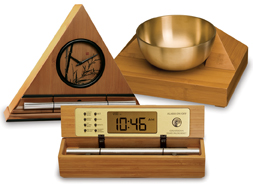 Soothing Chime Meditation & Yoga Timers from Now & Zen, Inc. Now & Zen – The Meditation
& Yoga Timer Store
1638 Pearl Street
Boulder, CO 80302
(800) 779-6383
Posted in Bamboo Chime Clocks, Meditation Timers, Meditation Tools, mindfulness practice, Well-being, yoga, Yoga Timer, Yoga Timers by Now & Zen, zen
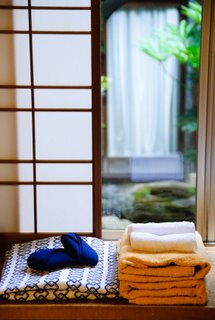 zen-like bedroom “That massive cleaning effort is a metaphor,” says Rabbi Sherre Hirsch, author of “We Plan, God Laughs.””When your physical surroundings are cluttered, your emotional and spiritual self is cluttered. If your space is clean, then your mind is open and you can let God in.”
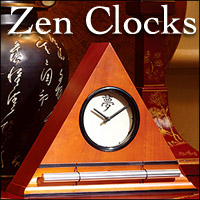 zen-like alarm clocks
Posted in Bamboo Chime Clocks, mindfulness practice
|
|
|
|